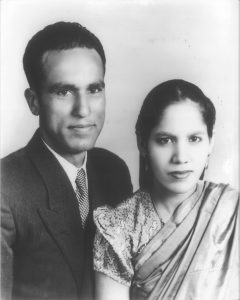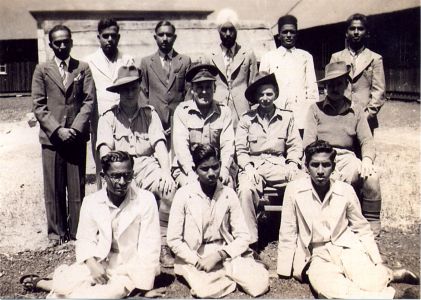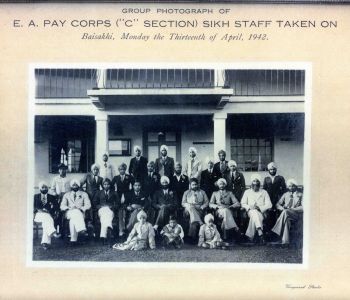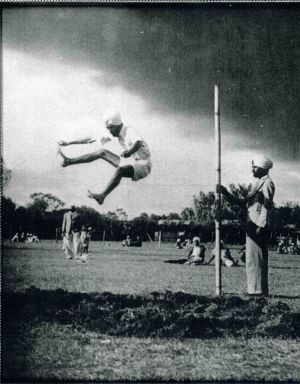
Mehar Singh Tumber and Surjit Kaur Tumber, Marysville, 1951. Courtesy of the Tumber Family.
Mehar Singh Tumber (September 12, 1920 – December 16, 2002) was a member of Yuba City’s Punjabi American community in the postwar era. He lived in Yuba City for 53 years. He helped found the Yuba City Sikh Temple at Tierra Buena and enthusiastically contributed to the annual Sikh parade. He was a successful farmer who raised a large family with his wife, Surjit Kaur, who was born circa 1933.
A native of Rampur, Punjab in British India, Mehar Singh Tumber was the youngest of five brothers. Raised in a farming village, Mehar learned skills that ultimately lead to his life journey. He left the village during his high school years and lived in a dormitory not far from where he was raised in the village of Mahilpur in District Hoshiarpur. It was during these years he gained a passion for sports especially track, soccer, and volleyball.
In 1939, upon graduating from high school, he left for Nairobi, Africa, where he worked in the British Army for five years. It was while employed in this position that he learned to speak English fluently and acquired accounting skills. When asked what the happiest moments in his life were, his days in Africa were first on his list.
In Nairobi there were many opportunities for locals to participate in sporting competitions and Mehar, being athletic, enthusiastically participated whenever the opportunity arose. In 1945, Mehar left Africa and returned to his native country, India, and began a trucking company with his brother in Bombay. The trucking business grew and Mehar stayed for another five years until he was called back by his parents to get married. He married Surjit Kaur in India. Surjit Kaur moved to Mehar’s village to live while he traveled abroad to the land of opportunity, the United States of America.
More
It was through his eldest brother, Sher Singh who arrived in America in the 1930s, that Mehar would migrate to San Francisco in 1949. Mehar rode on a bus from San Francisco to Marysville on which he met a very kind American couple. They helped Mehar throughout their long bus ride and maintained a friendship with Mehar and his wife throughout their lives.
Needing to seek employment, Mehar journeyed to Napa, CA, where his first job was to pick grapes. Finding the work grueling, he ultimately turned to farming in Yuba City where he spent the rest of his life. After a year working in the farming community, Mehar was able to save enough money to purchase his first property with his brother. This purchase would lead to others and so began a life of growing peaches and walnuts.
While residing on Winship Road in the 1950s and 1960s, Mehar and Surjit had the opportunity to meet many Asian-Indian students that had come to the United States to study and acquire degrees in a variety of professions. These students needed jobs, and Mehar was able to provide them a place to reside along with temporary jobs. This arrangement served these students well in that they were able to study around their work schedule. Many of these Asian Indian students maintained a relationship throughout their lifetime with Mehar and Surjit.
During the 1955 Flood in Yuba City, Mehar was one of many residents working on the Feather River levee prior to its breach. Upon hearing the “crack” of the levee, he fled home to gather his wife and two children. Fate as it was, the couple Mehar had met when he arrived to America would offer them refuge in their home in Colusa on Christmas Eve. Mehar would later take a boat back to his home to find that it was spared from any damage by a few inches.
One of the highlights of Mehar’s life was to attend the 1960 Winter Olympics at Squaw Valley with Surjit and close friends. His passion for sports was culminated in the goal of the Olympics: “to contribute to building a peaceful and better world through sport in accordance with Olympism and its values, including good governance and ethical principles.”
Mehar kept involved in local government, attending City Council meetings. It was during these meetings he would learn how the town of Yuba City was growing. Recognizing the opportunity of purchasing land on the outskirts of town, he purchased a plot of land on the corner of Tharp and Butte House Road in 1961, where he would build his final residence.
While farming played a significant role in Mehar’s life, he was also very involved in the Sikh religion. As was with many of the families that arrived in the first half of the 1900’s, it was necessary to travel to Stockton, Ca to attend services as this was the only Sikh Temple in northern California at the time. It was in the late 1960s that Mehar would team up with other local Sikhs to begin fundraising to build the first Sikh Temple in Yuba City. After a hard day’s work in the fields, he would clean up and begin a routine to raise money for this effort. In 1969, the doors to the first Sikh Temple in Yuba City was opened on Tierra Buena Road.
In those early years, Mehar along with other members of the Temple decided to have the first Sikh Parade and to Mehar’s good fortune and blessings, the parade would pass the property he purchased in 1961. This opportunity allowed Mehar to continue his contribution and support of the faith that meant so much to him. He would provide beverages along the path of the parade which has now expanded to the many generous food donations given by the Sikh Community during the annual Sikh parade that continues today.
As a father, Mehar raised four daughters and a son. His philosophy on life was simple as stated by one of the quotes he would often say to his children, “If there is a will, there is a way”. It is this “will” that became the foundation of how he lived his life whether it was giving his time in seva (selfless service) or tending to his crops.
During his life in America, it is his wife, Surjit, who would be by his side throughout the years. By the time of his passing, they had been married for fifty-six years. As a young bride, she would come to a country she knew very little about. She would learn to adapt by creating her own network of friends who would teach her a new way of living.
She, as many other women who were new to the country, would support her husband whether it was cooking meals at the Sikh Temple as part of her service to her faith, or facing the challenges of living on a farm.
Together Mehar and Surjit would overcome many challenges in life, together they would find happiness through the blessings they would receive. Recognizing these blessings, they would make every effort to provide the same opportunities as they had to others.
Their lives would be an example of faith, hope, and love.
Their memories are kept alive by their children and grandchildren.
All of the photographs are courtesy of the Tumber family.
SOURCE:
Co-Written with Ms Pamela Singh and Ms Raji Tumber, Daughters of Mehar Singh Tumber and Surjit Kaur Tumber, September 2016.
Punjabi American Heritage Society, Becoming American: The Story of Pioneer Punjabis and South Asians Donor Book (Yuba City, CA, 2012), 40-41.
Less






















